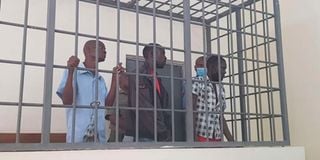How phone tracking tech helped nab 3 murder, gang rape Mombasa criminals

From left: Anthony Mutua, Collins Omondi and King Juspher Odhiambo before Shanzu court.
Three robbery-with-violence and gang-rape convicts would have gone scot-free had technology not been deployed that led to their arrest a year after committing the offences.
King Juspher Odhiambo, alias Ochuka, Collins Omondi and Anthony Mutua robbed and killed Patrick Kaimenyi Wanjohi on the night of September 16, 2017, at Senti-Kumi in Likoni, Mombasa. They then went on to gang-rape a woman who was with Wanjohi.
Wanjohi, who was a health worker at Tibuani Dispensary, and the woman had just left an eatery around 9pm when they were attacked by six people, who stole his Sony Xperia mobile phone worth Sh5,000, and her Infinix phone and clothes worth Sh27,600.
On August 28, 2018, almost a year later, Mr Martin Kioko was found with Wanjohi’s mobile phone, leading to his arrest and prosecution. However, charges against him were later dropped after he explained how he got the phone. He then became a state witness. Mr Kioko disclosed to investigators that Odhiambo had given him the gadget two days after Wanjohi was killed.
Court records show Mr Kioko had been living on the streets before Odhiambo took him in and taught him how to repair vehicles in a garage in Likoni. Mr Kioko, however, later moved out and rented his own house.
Mr Kioko explained that Mr Odhiambo borrowed from him Sh1,000 to buy the phone from Mutua while they were at the garage.
“Since I did not have a phone at the time, Odhiambo gave me the gadget to use,” he said.
An analysis of the phone’s International Mobile Equipment Identity (IMEI), the 15-digit number unique to each device, enabled the police to zero in on the killers. A report produced by Mr Joseph Leruk, an investigating officer working with Safaricom, not only led the police to the killers but also netted more witnesses to assist the prosecution.
Mobile phone
An analysis of the Wanjohi’s mobile phone from September 1 to December 1, 2017, led to the arrest of Mr Joseph Murimi and Mr Humphrey Otiende, who became prosecution witnesses. Sergeant Mohamed Hassan from the Homicide Unit said at least five people had used the phone after the murder. They include Omondi (second accused) and Mr Joel Govedi, a witness.
“The five people had all used the deceased’s phone on diverse dates between September 18, 2017, and February 10, 2018, when the handset was said to be stolen and thereafter the signal was lost,” he told Shanzu chief magistrate Florence Macharia.
Mr Kioko had led the police to arrest the three accused persons and the other three, who became state witnesses. The woman had identified Odhiambo and Omondi during an identification parade as the people who gang-raped her on the night her friend was killed and their items stolen.
Led in her evidence by state counsel Anthony Musyoka, she said she could identify the suspects because there was adequate light at the crime scene.
“The area was well lit as there were street lights and the visibility was good,” she said.
The woman said the six attackers demanded their belongings before dragging them separately to a nearby thicket. “I could hear the commotion with Wanjohi. The two who had dragged and sexually assaulted me in turns threatened to kill me if I screamed,” she told court.
The court also heard that phone location data placed Omondi at the crime scene at the time of the robbery. In their defence, the accused denied committing the offences, or handling or buying the deceased’s mobile phone.
Crime scene
Odhiambo said he had never gone to Likoni or even used the ferry. They both denied knowledge of the robbery and said they had signed the parade form under duress. Ms Macharia ruled that evidence adduced by the witnesses put Omondi and Odhiambo at the crime scene.
The court ruled that even though Mutua was not identified at the crime scene, the evidence that he had sold the phone to Odhiambo only two days after Wanjohi was killed linked him to the offence.
“The doctrine of recent possession makes this court to draw an inference of guilt as Mutua was in possession of a recently stolen phone and no explanation was given as to how he got it,” said the magistrate.
On the offence of rape, the court ruled that the victim positively identified Odhiambo and Omondi as the persons who gang-raped her. This was supported by medical reports. The magistrate concluded that the prosecution had proved its case beyond reasonable doubt and sentenced the three to death. “I have considered the mitigation of the accused, and the fact that life was lost arising from the violent action by the accused persons. I, therefore, sentence them to death by hanging as provided for by the law in respect to the offence of robbery with violence,” said Ms Macharia.
Their defence and mitigations were dismissed as mere denials as evidence against them was overwhelming.





